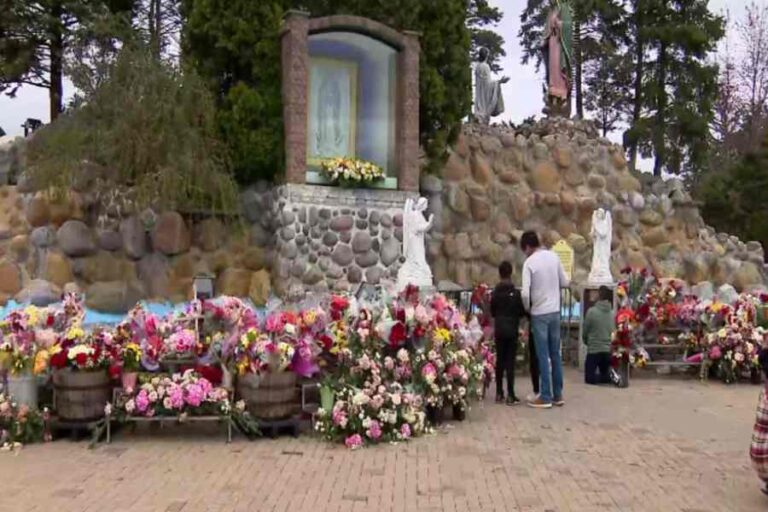On what was meant to be a joyous Easter Monday, a wave of grief swept across Chicago’s Catholic community. Instead of solely celebrating Christ’s resurrection, the faithful awoke to heartbreaking news: Pope Francis—lovingly referred to by many as “Papa Francisco”—had passed away. The bells of churches across the city tolled not in celebration, but in mourning. From Pilsen to Holy Name Cathedral, a spirit of solemn remembrance gripped the city.
Pope Francis, the first Latin American pope from Argentina, was more than a religious figure to many in Chicago. He was a symbol of hope, humility, and humanity. Known for his advocacy for the poor and marginalized, he challenged systems of power both within and outside the Catholic Church. He chose simplicity over grandeur, compassion over politics, and people over protocol.
In communities like Pilsen and Little Village, where immigration issues strike a deeply personal chord, his voice resonated like no other. Father Charles Dahm, former pastor at St. Pius V Parish, said his community closely followed Francis’ mission of mercy, inclusion, and justice. He added that all eyes are now on the next conclave, hoping the next pope will continue Francis’ work, especially in advocating for migrants and the poor.
Later that evening, the Shrine of Our Lady of Guadalupe in Des Plaines held a bilingual requiem mass in his honor. It became a place of reflection and solace for hundreds. Worshippers gathered to pray the rosary—one of the Pope’s favorite spiritual practices—and to participate in a special holy hour followed by mass. A symbolic casket was placed in the Chapel of St. Joseph, representing the pope who had never visited the city but had spiritually touched so many within it.
Mourners spoke about his warmth and relatability. “It’s like losing someone from your own family,” said Fabiola Malagon. Rev. Esquiel Sanchez, who led the mass, reflected on the Pope’s last public appearance—a blessing from the Vatican balcony on Easter Sunday. “He knew that was his last blessing,” Sanchez said. “He wanted to be a pastor until the very end.”
Pope Francis often challenged Church leaders to be more compassionate and open. “He was strong with the clergy, tough even,” Sanchez said. “But he did it to soften the Church itself, to make it more welcoming.” That philosophy brought countless people back into the fold, especially those who had felt unwelcome in traditional church spaces.
At Holy Name Cathedral, a portrait of Pope Francis stood at the altar as pastors honored his legacy during Mass. Fr. Andy Matijevic, a young associate pastor, expressed sadness that he would never fulfill his dream of meeting the Pope during an upcoming trip to Rome. “He brought light to a dark world,” Matijevic said. “And now, it’s on us to keep that light burning—by building bridges, not walls.”
Many parishioners echoed this feeling of loss. “He was the first pope I really knew,” said Jose Perez, who attended the requiem mass. “He helped my faith grow. He gave us hope, especially people in my community.” For Perez and others, Pope Francis wasn’t just the head of the Catholic Church—he was the heart of it.
The Hispanic community, in particular, felt a strong bond with Francis. His South American roots, his fluency in Spanish, and his tireless advocacy for justice made him feel like one of their own. “He made us proud,” said Rev. Sanchez. “He reminded us that the Church belongs to all people, not just the powerful.”
As the world prepares to say its final farewell, the Vatican now begins its official mourning process. Pope Francis will be honored with nine days of ceremony and reflection. His funeral, expected to be held in St. Peter’s Square within the week, will gather world leaders and Catholic faithful from every corner of the globe.
True to form, Pope Francis requested to be buried not within the Vatican, but in one of his favorite churches just outside its walls—a humble gesture, in line with the way he lived his life.
After the funeral, the College of Cardinals will convene in the Sistine Chapel for a secret conclave. Chicago’s own Cardinal Blase Cupich will participate in choosing the Church’s next leader. A two-thirds majority is required to elect the new pope, and while the process could be swift, it may take days or weeks.
As the Church prepares for its future, the loss of Pope Francis has left a profound impact. His legacy—rooted in humility, courage, and compassion—continues to echo through the hearts of millions. In Chicago, he’ll be remembered not only as a world leader but as a friend, a spiritual guide, and a beacon of hope.
For many, his passing marks the end of an era. But as parishioners lay flowers, light candles, and whisper prayers, one thing is clear—his spirit lives on in the communities he loved and the lives he changed.
As Jose Perez put it simply, “We’re not going to see someone like him again for a very long time. This was once in a lifetime.”
